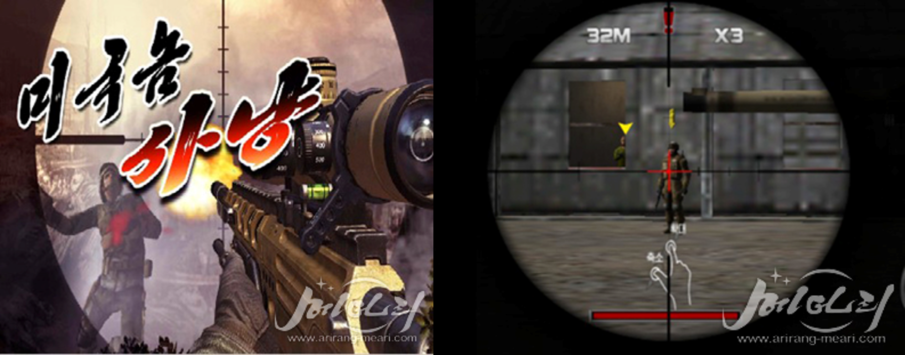A North Korean video game developer claims to have released a video game called “Hunting Yankee” inside the reclusive country.
The game purports to be a first-person shooter, similar to the massively popular “Call of Duty” franchise, the objective of which is to kill American soldiers with a sniper rifle. Images were released appearing to depict gameplay which show a soldier within crosshairs being shot.
News of the game was released on an official state-run media website Arirang-Meari, first reported on by English-language NK News. A rough translation from the official article announcing the game says that “players can implement various special behaviors in a virtual world reminiscent of a breathtaking battle scene.”
The game follows a number of other state-sponsored North Korean video games recently released which are thinly veiled propaganda platforms to illustrate the DPRK’s resentment of the United States.
Confrontation war” involves “destroying enemy submarines using depth bombs, nuclear depth bombs, and anti-submarine rockets,” while “Guardian” allows users to simulate naval warfare with “cannons, multiple rocket launchers, and mines.”
“Goguryeo battlefield” is a historical game, which “vividly displays the battlefields” of Ancient Korea, according to NK News.
Video games and other entertainment media have taken on global political implications in the past, most notably with the North Korean regime, which takes special offense to its likeness being used in foreign movies and games. The original invading army in the 2012 remake of “Red Dawn” was the People’s Liberation Army of China. Fearing an economic backlash from the Chinese, the studio making the film settled on a reliably innocuous enemy in the North Koreans, which drew sharp criticism from the regime.
But despite the DPRK being a safe punching bag for American entertainment, the regime struck back after the release “The Interview” in 2014, a comedy which depicts the assassination of dictator Kim Jong un, by orchestrating a massive hack against Sony Pictures.
It’s unclear how many North Korean citizens will actually be able to play such a game, as widespread poverty and lack of reliable services like electricity affect most of the country.
Image via Arirang-Meari
Already have an account? Sign In
Two ways to continue to read this article.
Subscribe
$1.99
every 4 weeks
- Unlimited access to all articles
- Support independent journalism
- Ad-free reading experience
Subscribe Now
Recurring Monthly. Cancel Anytime.
A North Korean video game developer claims to have released a video game called “Hunting Yankee” inside the reclusive country.
The game purports to be a first-person shooter, similar to the massively popular “Call of Duty” franchise, the objective of which is to kill American soldiers with a sniper rifle. Images were released appearing to depict gameplay which show a soldier within crosshairs being shot.
News of the game was released on an official state-run media website Arirang-Meari, first reported on by English-language NK News. A rough translation from the official article announcing the game says that “players can implement various special behaviors in a virtual world reminiscent of a breathtaking battle scene.”
The game follows a number of other state-sponsored North Korean video games recently released which are thinly veiled propaganda platforms to illustrate the DPRK’s resentment of the United States.
Confrontation war” involves “destroying enemy submarines using depth bombs, nuclear depth bombs, and anti-submarine rockets,” while “Guardian” allows users to simulate naval warfare with “cannons, multiple rocket launchers, and mines.”
“Goguryeo battlefield” is a historical game, which “vividly displays the battlefields” of Ancient Korea, according to NK News.
Video games and other entertainment media have taken on global political implications in the past, most notably with the North Korean regime, which takes special offense to its likeness being used in foreign movies and games. The original invading army in the 2012 remake of “Red Dawn” was the People’s Liberation Army of China. Fearing an economic backlash from the Chinese, the studio making the film settled on a reliably innocuous enemy in the North Koreans, which drew sharp criticism from the regime.
But despite the DPRK being a safe punching bag for American entertainment, the regime struck back after the release “The Interview” in 2014, a comedy which depicts the assassination of dictator Kim Jong un, by orchestrating a massive hack against Sony Pictures.
It’s unclear how many North Korean citizens will actually be able to play such a game, as widespread poverty and lack of reliable services like electricity affect most of the country.
Image via Arirang-Meari










COMMENTS